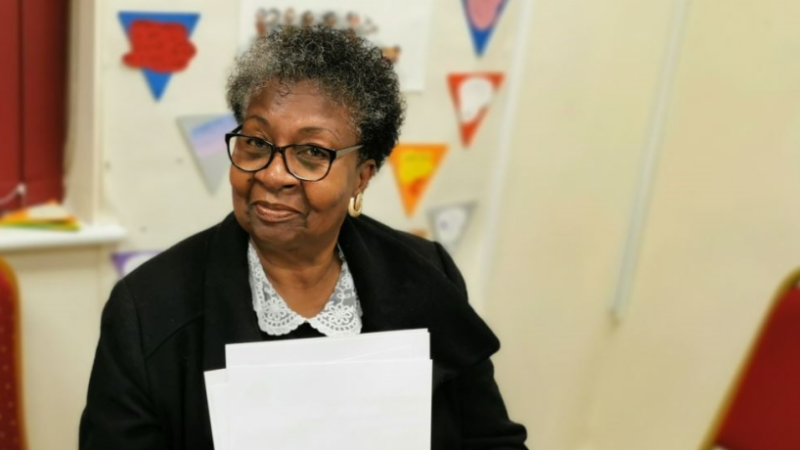People at risk of developing Type 2 Diabetes have been getting fitter and healthier through an innovative health and fitness programme, run by the NHS and supported by community groups in Wandsworth and Merton. Using a range of physical exercises and dietitian’s advice, the Diabetes Prevention Decathlon has empowered local people to develop healthier habits which they can build into their everyday lives.
From London to Seoul
Imagine putting on your trainers and walking from London to South Korea.
That’s the incredible total distance paced out by 28 Merton and Wandsworth residents taking part in the Diabetes Prevention Decathlon, an innovative 10-week programme to prevent people from developing Type 2 Diabetes.
Between them, participants also lost 66.5kg in weight with one person shedding over 10kg. On average, people taking part became almost 50% more physically active.
Pauline, a nurse who took part in the Decathlon (pictured above), has experienced a dramatic and lasting change in her lifestyle. “I have lost 8kg and feel fitter and stronger,” she says. “Now the programme has ended, I have tried to maintain daily walking of 3,000 steps and at weekends, I aim to do 8,000 plus.
“I continue to maintain healthy choices in my diet, exercise and walks. The programme has had a great impact on my family, friends, and myself, as I would openly discuss the benefits and the healthy choices available.”
Small steps to better health
The ‘Diabetes Prevention Decathlon’ scheme was run by the NHS, in collaboration with Wandsworth Community Community Network (WCEN), and community partners in Merton and Wandsworth, including the Harlequins Foundation and Sweatco, between February 2021 and February 2022.
It was financed using £30,000 from a £50,000 NHS Charities grant as part of their ongoing support for empowering communities and addressing health inequalities. Part of the £30,000 was allocated for funding to develop a spin-off programme called the Pentathlon,
Dipti Gandhi, the Diabetes Primary Care Clinical Lead for NHS South West London said: “We know changes to lifestyle can reduce the risk of Type 2 diabetes and make a huge difference to someone’s health and wellbeing.
“The Decathlon programme used small common-sense steps to help people get control of their own health. It also combined education, a fun physical activity programme and innovative new technology such as the Sweatco app which really helped to incentivise participants. They also got great support from the health coaches.
All the people taking part in the Decathlon were recruited through health checks run at a range of faith centres across the two boroughs. These included the Pollards Hill Baptist Church and Makkah Masjid Mosque in Merton and the New Testament Assembly Church and Eritrean Muslim Community Association in Wandsworth where the WCEN played a key role in developing and publicising the event. Due to Covid, all the sessions were held virtually.
Lively pace of activity
During the Decathlon programme, there were two one-hour sessions per week. These were:
- one hour of group-based interactive education delivered by a specialist diabetes dietitian facilitator
- one hour of physical activity designed and delivered by a specialist sports facilitator from the Harlequins Foundation
The exercise sessions included 10 different physical activity sessions to keep a lively varied pace. Things were also kept varied and interesting through the Sweatcoin physical activity app which has a wide range of bespoke content. Participants were pointed in the direction of other local opportunities for activity and joining in the community.
At the start of the programme, everyone taking part gave a short talk about themselves and what they hoped to get out of the Decathlon.
“This was a great idea, as it produced such a warm and friendly atmosphere,” says Pauline.
“Each meeting would reflect on the previous week’s learning to ensure that the topic was understood. This definitely created an environment for learning. Each week there were different goals and prizes to be won. This made the programme even more interesting.”
People who successfully completed the Decathlon were invited along to an awards ceremony at AFC Wimbledon in March this year where they received certificates and celebrated the changes they had made in their lives.
Culturally sensitive programme
Dipti said: “Often the communities with the greatest health needs have the lowest uptake in diabetes prevention programmes because of poor experiences and distrust. One of the great strengths of the Decathlon programme is that it is culturally sensitive to the needs of those taking part.
“Working with WCEN helped us to produce a culturally relevant programme which has delivered a sustainable offer for communities which also addressed their families’ health and wellbeing.”
“The programme benefitted tremendously from the support we got from community leaders across Merton and Wandsworth. We also had invaluable advice from Selma Mehar who is a nationally renowned dietitian.”
One of the key sustainable legacies of the programme has been the creation of the ongoing Pentathlon scheme. This spin off programme from the Decathlon involved five volunteer health coaches who were trained to deliver five out of 10 sessions as part of a health and well programme.
The first Pentathlon has been run at the New Testament Assembly Church in Wandsworth and a Decathlon programme has now been commissioned by Public Health Richmond.
The remaining £20k from the £50,000 NHS Charities grant has been used for upskilling volunteer community health coaches and expanding physical health work to Merton. This has included the delivery of three health and wellbeing events which include health checks (type 2 diabetes, blood pressure and AF) and health promotion and education.
